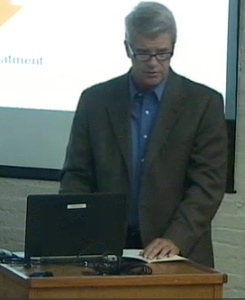Submitted by Suanne Z. Thamm
Reporter – News Analyst
August 22, 2019

At the beginning of the August 20, 2018 Regular Meeting of the Fernandina Beach City Commission (FBCC), both Westrock and the city spent considerable time putting rumors to rest and addressing public concerns over the reported chemical spill into the city’s sanitary sewer system that occurred August 13. Due to quick action of city Wastewater Treatment employees and supervisors along with full cooperation from Westrock, the problem was quickly identified and remedied. By Monday morning, city sanitary sewer service had been restored to Westrock and the ph of the city’s wastewater treatment areas had returned to safer levels.
Daniel C. Rowland, General Manger of Westrock’s Fernandina Beach plant, addressed the FBCC to explain what happened, corrective measures taken and preventive actions to guard against future releases. City Utilities Director John Mandrick lauded Westrock’s full cooperation and explained the redundancies built into the city’s treatment processes that prevented disaster. Commissioners were effusive in their praise for the efforts of city employees who worked over the weekend to contain the damage and rectify problems

Both Rowland and Mandrick agreed that the problem was caused by an accident. A faulty gauge caused the release of excessive amounts of alum (ammonium sulfate) into the city’s sanitary sewer line. Ammonium sulfate is an inorganic salt with many commercial purposes. Like lime, it lowers alkalinity in soils; but excessive amounts in the wastewater treatment process can interfere with the bacterial process that break down organic waste. If those bacteria die off as a result, it can take 20 days for new bacteria to activate, meaning that the discharge of safe wastewater into the Amelia River could be compromised.
Mandrick said that city supplies of chemical to counteract the effects of the ammonium sulfate were insufficient to address the problem, but that Westrock had immediately stepped up sending 2,000 pounds of soda ash from their own supplier in Jacksonville that arrived on the same day as the spill. An additional 7,000 pounds of soda ash was delivered from Atlanta. “Without that,” Mandrick said, “we would not have been able to neutralize the ammonium sulfate online.”
Mandrick said, “There was no intentional dumping, and we [city and Westrock] worked well together to respond to the accident.” Mandrick continued, explaining that because the city has a spare treatment train, his team was able to switch the city’s normal waste to the seond train, thereby containing the spill.
Despite social media scares that circulated throughout the community following the accident, there was never a “toxic spill.” The spill never affected the city’s drinking water supply. Mandrick said that at its worst, the ph level of the discharge into the Amelia River had been at 3, but that was for a brief period and did not produce any visible effects at the discharge point. He added that under the city’s permit, such an event was provided for.

Ammonium sulfate can cause severe irritation and inflammation of the respiratory tract if inhaled. Eating or drinking ammonium sulfate will cause irritation in the gastrointestinal tract like nausea, vomiting, and diarrhea, although it isn’t toxic unless consumed in large quantities.
This was the first accident involving a chemical discharge from the mills in 35 years.
 Rowland explained that he has examined all the Westrock lines carrying chemicals and associated gauges to make sure that such an incident cannot occur in the future. As a further safety precaution, Westrock has installed monitoring equipment that would immediately divert discharge to the city’s sanitary system into the plant’s internal system should ph levels fluctuate to dangerous levels.
Rowland explained that he has examined all the Westrock lines carrying chemicals and associated gauges to make sure that such an incident cannot occur in the future. As a further safety precaution, Westrock has installed monitoring equipment that would immediately divert discharge to the city’s sanitary system into the plant’s internal system should ph levels fluctuate to dangerous levels.
Rowland told commissioners, “On behalf of all the Westrock employees, I regret this accident and we will do anything we can to get the city’s wastewater treatment back to normal. I want to personally thank John Mandrick and Dale Martin for their leadership during this period. We are very fortunate to have such a well run treatment plant in our city.”

Since when did aluminum sulfate (alum) acquire ammonia as a component? This one of the oldest and least dangerous chemicals on earth. It has been used in making pickles in the past. The people who left replies calling this a dangerous chemical should be ashamed of their jumping to hystarics before the know and understand the problem. Some one named Ross in particular.
In fact alum is used in water treatment facilities.
Good to see that WestRock has now installed monitoring equipment to better detect any future occurrence and take automated bypass action; although I would have thought that would have been a basic requirement from the start. Hopefully the monitoring system has an automated notification feature that if there is an out of normal condition, the appropriate personnel are notified so they can ensure the bypass function has been properly engaged.